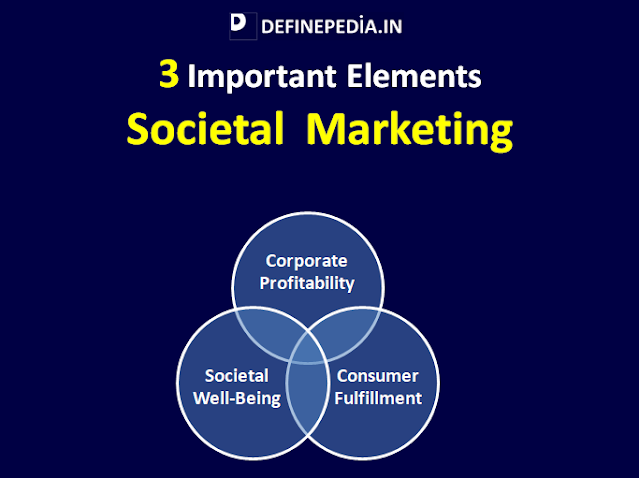The societal marketing concept is a Marketing Strategy that helps to balance the interests of different stakeholders, including consumers, companies, and society. It is a customer-oriented approach that highlights the importance of regarding the impact of marketing decisions.
{tocify} {$title=Table of Contents}
Definition
The societal marketing concept holds that a company should make marketing decisions by considering consumers’ wants, the company’s requirements, and society’s long-term interests. It underlines that an organization must make strategic marketing decisions keeping in mind the welfare of society. Social marketing is an approach used to develop activities aimed at changing or maintaining people’s behavior for the benefit of individuals and society as a whole
Why Does the Societal Marketing Concept Matter?
As consumers are increasingly aware of social and environmental issues, companies that adopt. This approach can boost their relationship with customers by proving their responsibility and sustainability. This help to improve brand reputation, and increased customer loyalty, and profitability in the long run.
How to Implement the Societal Marketing Concept
Implementing the societal marketing concept involves considering the impact of marketing decisions on all stakeholders. This could include conducting market research and developing products and strategies. So that meet the needs and preferences of consumers and society, practicing sustainable methods, building partnerships, and constantly watching and improving marketing patterns.
Implementing the societal marketing concept requires a company to analyze the impact of its marketing decisions on all stakeholders, including consumers, the company, and society. So some steps that companies can take to install this concept by including:
- Conducting market research to understand consumer preferences and the impact of marketing decisions on society and the environment
- Developing products and marketing strategies that take into account the needs and preferences of consumers.
- Engaging in sustainable practices, such as reducing waste, conserving resources, and promoting eco-friendly products
- Building partnerships with stakeholders, such as suppliers, customers, and community organizations, to create mutually beneficial relationships
- Constantly monitoring and improving the company’s marketing practices.
3 Important Elements of Societal Marketing
As companies prepare their marketing strategies. They must carefully weigh and integrate three important elements: firm profitability, consumer desires, and the greater good of society.
Societal Well-Being: At the forefront of all business endeavors must be a commitment to serving society and fostering human welfare.
Consumer Fulfillment: Products and services must satisfy the needs and wants of the customer.
Corporate Profitability: To cultivate long-term client relationships, show corporate responsibility, and offer products. So meeting consumer expectations are integral to realizing economic success and maximizing wealth.
Benefits of the Societal Marketing Concept
Societal marketing has many benefits to a company, such as a boost in brand reputation and customer loyalty, and a more sustainable business model. And also the ability to attract employees, and a competitive edge over companies that don’t rank these issues.
Adopting the societal marketing concept can bring many benefits to a company, including:
- Improved brand reputation and customer loyalty
- Increased profitability over the long term
- A more sustainable business model that takes into account the well-being of society and the environment
- The ability to attract and retain talented employees who are passionate about social and environmental issues
- A competitive advantage over companies that do not prioritize the interests of society and the environment.
How companies integrate Societal Concerns
Here are a few examples of how companies integrate societal concerns into their marketing strategies. To not only improve their bottom line but also make a positive impact on society.
- Reducing Plastic Waste: Many firms have started using biodegradable or recyclable packaging to cut down on plastic waste. This not only helps the environment but also enhances the brand image in the eyes of consumers.
- Supporting Local Communities: Companies often invest in local communities by providing jobs, funding education and healthcare initiatives, and donating to charitable causes.
- Promoting Sustainability: Some companies are making conscious efforts to reduce their carbon footprint and promote sustainability by adopting green energy sources, reducing water usage, and minimizing waste.
- Supporting Social Issues: Some brands take a stand on political or social issues, such as gender equality, LGBT rights, and anti-racism, by supporting advocacy groups and spreading awareness through their marketing campaigns.
- Encouraging Healthy Lifestyle: Health-conscious brands promote healthy living by offering organic, low-fat, or vegetarian options and educating customers about the benefits of a balanced diet and regular exercise.
Societal Marketing: Three Real-Life Examples
Here are three compelling examples that showcase the power of societal marketing in action.
The Body Shop: Pushing the Boundaries of Morally Sound Marketing Practices
Since its start in 1976, The Body Shop has been blazing a path in ethical marketing, consistently aiming toward sustainability and corporate responsibility. So the brand’s commitment to utilizing environmentally packaging and procuring raw materials from struggling communities showcases the potential for businesses to make a positive impact while still delivering top-notch products.
Ben & Jerry’s: Championing the Fight for Inclusivity and Equality
Ben & Jerry’s, the renowned ice cream company, has been a steadfast advocate for social justice for years. From its support of marriage equality to its promotion of environmental sustainability, the brand has proven that corporations can play a pivotal role in catalyzing positive change. So with their unconventional “Business As Unusual” mentality, Ben & Jerry’s serves as a shining example of how companies can strike a balance between profitability and promoting societal welfare.
Patagonia: Leading the Way in Environmental Preservation
Patagonia, the go-to name in outdoor apparel, is at the forefront of environmental stewardship in the business world. By dedicating 1% of its sales to environmental causes and preparing products with sustainability in mind, the company sets a new standard for corporate responsibility. So their unwavering dedication to the planet serves as a source of inspiration for those who believe that business can be a driving force for good.
Was this helpful?
0 / 0
